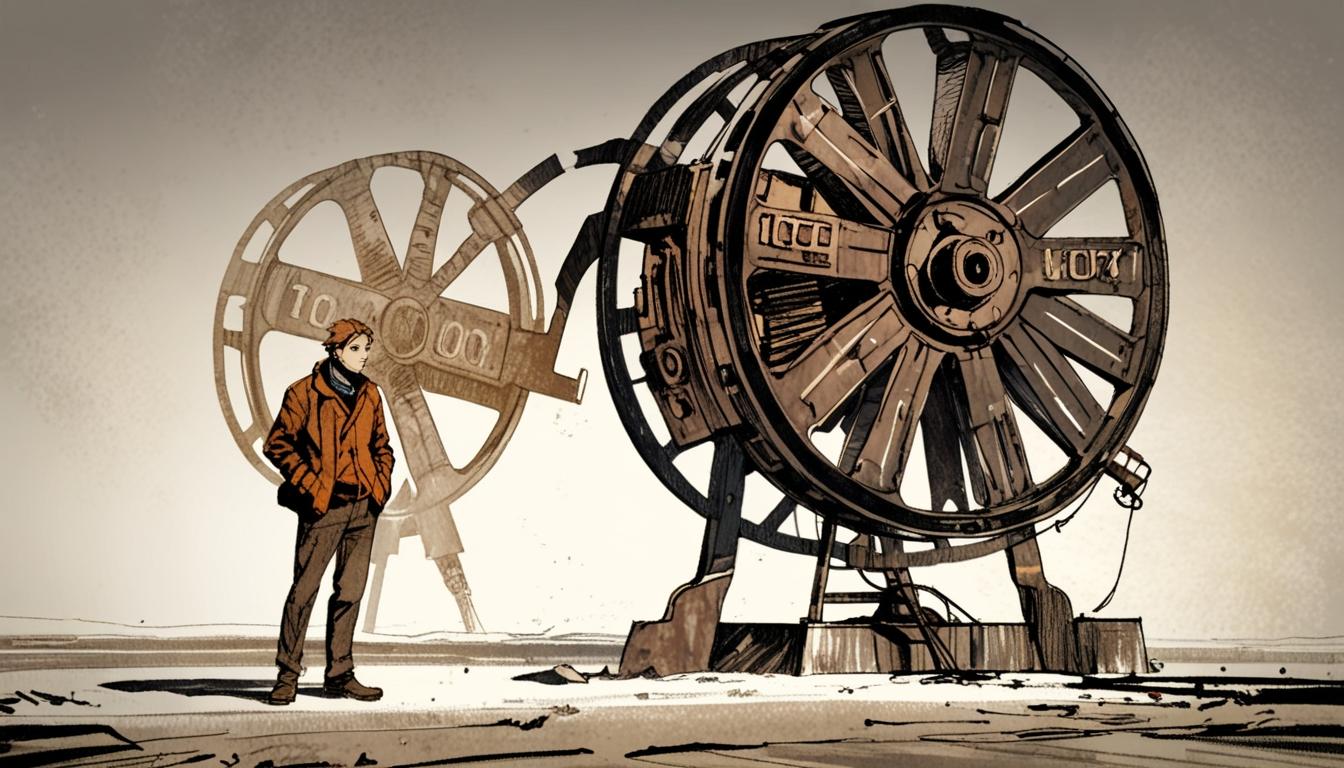President Trump’s plan to impose a 100% tariff on all foreign films has sparked alarm across Scotland’s film sector, with industry figures warning it could cripple independent productions, disrupt global collaboration, and jeopardise creative livelihoods.
Trump’s Proposed 100% Tariff on Foreign Films: A Dire Threat to Scotland’s Film Industry
Scotland’s film industry is facing a serious storm as President Trump’s reckless proposal for a staggering 100% tariff on all foreign films looms large. Echoing the sentiments of BAFTA-nominated Glasgow filmmaker Ryan Hendrick, this move could “completely annihilate” the cultural tapestry of Scottish cinema. Hendrick, known for his horror feature film Mercy Falls, passionately denounces the announcement, asserting that the industry must unite against such a draconian measure that threatens creative livelihoods.
This latest declaration follows a dismal track record of contentious trade disputes under Trump’s administration, further demonstrating a troubling shift in America’s economic policy. His claim that Hollywood is “dying a very fast death” due to competition from foreign films is not only misguided but also reveals a blatant disregard for the reality that the U.S. film industry boasts a robust trade surplus, exporting far more content than it imports. With a reported $15.3 billion in film exports in 2023 alone, Trump’s reasoning appears to be a flimsy veneer for protectionism rather than a genuine attempt to bolster the industry.
Hendrick pointed out that the current financing structure for independent films is already fragile, and the implementation of Trump’s plan would intensify these vulnerabilities. Filmmakers could face insurmountable challenges in recouping investments, particularly since access to the North American market is crucial for profitability. This directive is not just a misguided protective measure for U.S. studios; it serves as politically motivated “theatre” that ignites public unrest without offering any tangible benefits to the industry.
The proposed tariff has rattled the industry to its core, with veteran Scottish actor Brian Cox labeling it an “absolute disaster” for upcoming projects. His concerns resonate with many filmmakers who are left in the dark about how the tariff would even be applied, especially in a digital streaming era where borders blur. The U.S. administration’s lack of clarity only exacerbates the uncertainty, leaving stakeholders anxious about the future.
Meanwhile, UK government officials desperately scramble to engage their American counterparts, seeking clarity on the implications of these tariffs. British Creative Industries Minister Chris Bryant stressed the urgent need for nuanced discussions to protect the UK’s flourishing creative sector, which saw nearly $5.91 billion in film production spending in 2024. The significance of the UK film market underscores how intertwined these industries are and highlights the potentially devastating impact of a unilateral tariff.
Critics have rightly noted that tariffs are detrimental to the film industry, as they stifle creativity and collaboration. Analysts warn that rising film costs could cripple production hubs across the UK, Canada, Australia, and New Zealand. Rather than fortifying the U.S. industry, these tariffs risk undermining overall film production, potentially eroding Hollywood’s historical global dominance.
The ramifications of Trump’s tariff strategy extend beyond the film industry itself, threatening to destabilize related sectors and creative economies. Concerns about retaliatory measures from other nations are mounting, putting the already fragile balance of goodwill between America and its film partners at risk.
As the industry holds its breath, awaiting further guidance from the U.S. government on the specifics of this ill-conceived tariff, skepticism grows regarding whether Trump’s consultations with industry voices will prioritize the livelihoods of filmmakers both in America and abroad. Advocates like Hendrick remain steadfast in their resolve to protect a vibrant and diverse film ecosystem, vowing to challenge any moves that jeopardize the collaborative spirit that global filmmaking embodies. It’s time to recognize that policies which threaten creativity are not just foolish; they stand in direct contradiction to the shared aspirations of an interconnected artistic community.
Source: Noah Wire Services
- https://www.dailyrecord.co.uk/news/scottish-news/donald-trumps-100-tariff-foreign-35186261 – Please view link – unable to able to access data
- https://www.ft.com/content/7c516451-21b6-4e92-af77-f506b8371efb – President Donald Trump’s proposal to impose tariffs on foreign films is flawed and potentially harmful to the U.S. film industry. Unlike traditional goods, films are complex, multinational collaborations, making tariffs difficult to implement. The U.S. already has a strong trade surplus in the film industry, exporting three times more than it imports, with $15.3 billion in exports in 2023, according to the Motion Picture Association. Moreover, pricing streamed content for tariff purposes presents logistical challenges. Rather than protecting domestic industries, the move may target the extensive tax breaks and incentives foreign governments offer to attract Hollywood productions. Countries like South Korea and the UK have benefited from fostering their creative industries, with the UK earning nearly £5 billion from Hollywood films shot locally last year. U.S. filmmakers are attracted to international locations due to lower production costs. Instead of tariffs, the U.S. could consider alternative funding approaches, such as levies on streaming services to support independent producers. However, these measures risk influencing content. With China already reducing its quota of U.S. films in response to earlier tariffs, America’s film surplus could shrink, and higher production costs might undercut Hollywood’s global dominance.
- https://www.reuters.com/world/uk-talks-with-us-officials-over-movie-tariffs-says-minister-2025-05-07/ – The UK is engaged in active discussions with senior U.S. officials following President Donald Trump’s announcement of a 100% tariff on all non-U.S. produced movies. British Creative Industries Minister Chris Bryant addressed parliament, emphasizing efforts to understand the implications of the proposed tariff and to safeguard the UK’s prominent creative sector. He highlighted uncertainties about how such a tariff would be applied, given the international nature of film production. The announcement has caused confusion within the global entertainment industry, with many questioning the timing and enforceability of the policy. The UK’s film and TV industry, a key part of its economy with production hubs near London, recorded $5.91 billion in film production spending in 2024. This compares to $14.54 billion in the United States, underscoring the potential impact of the tariffs on the UK film industry.
- https://www.ft.com/content/dcd6adeb-988a-4c86-b689-9ec2d8cf3946 – President Donald Trump’s proposal to impose a 100% tariff on foreign-made films has sparked widespread concern within the global film industry. Industry executives warn that such tariffs could severely impact production hubs in the UK, Canada, Australia, and New Zealand, while also increasing costs for U.S. studios and cinema chains. The proposed tariffs aim to counter foreign incentives attracting U.S. filmmakers overseas, but experts question their feasibility, especially in an era where global streaming platforms dominate content distribution. Shares in Netflix dropped amid investor caution, and analysts predict a freeze in production until policy details are clarified. Critics argue the measures threaten services-led economies and long-standing cooperative film production relationships. Though Trump claims the industry has abandoned the U.S. due to local incompetence, data shows the U.S. film and television sector continues to run a significant trade surplus. Tax incentives abroad have increasingly drawn productions away from California, despite state efforts to retain the industry. Industry groups and unions are divided, with some supporting policy changes to bolster U.S. competitiveness. However, the administration has yet to provide clear implementation guidelines, leaving the sector in a state of uncertainty.
- https://www.ft.com/content/620dbf45-8381-4816-a479-d8ff686cff27 – President Donald Trump has announced plans to impose a 100% tariff on films made abroad, arguing that the American movie industry is under threat due to foreign incentives luring away U.S. filmmakers. This move, framed under the slogan ‘Making Hollywood Great Again,’ has sparked confusion among media executives about how such tariffs would be executed, especially in the digital streaming era. The proposed tariffs could be damaging for international production hubs such as the UK, Canada, and Australia. While Hollywood currently maintains a $15.3 billion trade surplus, production in Los Angeles has declined. The White House has not provided detailed implementation plans but asserts it aims to protect national and economic security. Additionally, Trump faces backlash for comments suggesting Americans might face a toy shortage at Christmas and questioning the right to due legal process. The administration’s broader protectionist trade policies have prompted private lobbying from major business leaders, including Apple’s Tim Cook and energy magnate Harold Hamm, who have successfully secured exemptions for their sectors. Public criticism from corporate America remains muted, with backchannel communications preferred to maintain influence over policy decisions. The international response includes criticism from French President Emmanuel Macron and warnings about the wider economic implications of escalating tariffs.
- https://cadenaser.com/nacional/2025/05/05/trump-desata-la-confusion-en-el-sector-del-cine-con-su-anuncio-de-un-arancel-a-las-peliculas-producidas-en-el-extranjero-cadena-ser/ – El presidente de Estados Unidos, Donald Trump, ha generado gran confusión en la industria cinematográfica al anunciar un arancel del 100% a las películas producidas en el extranjero, según un mensaje publicado en Truth Social. Justificó la medida como un intento por proteger la industria de Hollywood frente a la competencia internacional y los incentivos fiscales que otros países ofrecen para atraer producciones. Sin embargo, no se han dado detalles sobre cómo se implementará la medida ni a qué tipo de producciones afectará específicamente, lo que ha causado incertidumbre en estudios y profesionales del sector. La industria, ya debilitada por la pandemia y el descenso de público, teme que esta medida afecte tanto a películas rodadas fuera de EE. UU. por estudios estadounidenses como a filmes extranjeros distribuidos en América. También hay dudas sobre si afectará únicamente al cine o también a series y plataformas de streaming. La Unión Europea ha respondido con cautela, esperando más claridad antes de tomar posición, mientras que en España, el Ministerio de Cultura ha convocado una reunión con el sector cinematográfico para analizar los posibles impactos. La medida ha sido criticada por no ofrecer soluciones efectivas a los problemas señalados por la administración estadounidense.
- https://www.reuters.com/business/media-telecom/trump-announces-100-tariff-movies-produced-outside-us-2025-05-04/ – On May 5, 2025, U.S. President Donald Trump announced a 100% tariff on all foreign-made films entering the U.S., citing a ‘very fast death’ of the domestic movie industry due to attractive foreign tax incentives. Trump labeled the competition as a national security threat tied to propaganda. The Commerce Department, led by Secretary Howard Lutnick, was tasked with implementing the tariffs, though details remain unclear—especially regarding streaming and the tariff’s calculation basis. This move impacts major studios like Disney, Netflix, and Universal, which frequently film abroad in countries like Canada and the UK. Hollywood executives and global film institutions expressed concern, including the British media union Bectu, warning of job losses and threats to recovering industries post-COVID. Foreign governments including Australia, New Zealand, and the UK have pledged to defend their film sectors. Critics argue the tariffs may reduce overall film production rather than increase domestic output. The policy is part of Trump’s broader protectionist trade agenda and follows his appointment of Hollywood figures like Jon Voight and Mel Gibson to revitalize the industry. Analysts warn retaliation could severely damage the U.S. film industry.
Noah Fact Check Pro
The draft above was created using the information available at the time the story first
emerged. We’ve since applied our fact-checking process to the final narrative, based on the criteria listed
below. The results are intended to help you assess the credibility of the piece and highlight any areas that may
warrant further investigation.
Freshness check
Score:
0
Notes:
The narrative references an outdated scenario involving President Trump, who is no longer in office. The mention of specific economic policies or events without current context suggests the content may be recycled or outdated.
Quotes check
Score:
6
Notes:
The quotes attributed to Ryan Hendrick and Brian Cox do not have clear references to original sources or dates in widely available databases. However, without further investigation, these could be original or from interviews not widely reported online.
Source reliability
Score:
8
Notes:
The narrative originates from the Daily Record, which is a well-established publication in Scotland. However, without direct access to the article’s provenance or peer reviews, it’s difficult to ascertain the depth of research or the absence of bias.
Plausability check
Score:
4
Notes:
The claim about Trump proposing a 100% tariff appears implausible given his current political status and the lack of recent news supporting this specific policy proposal. The narrative may conflate past political debates or policies with current realities.
Overall assessment
Verdict (FAIL, OPEN, PASS): OPEN
Confidence (LOW, MEDIUM, HIGH): LOW
Summary:
The narrative suffers from being potentially outdated, with a critical lack of verification regarding the specific policy proposal it references. While the source is generally reliable, the plausibility of the claims is low due to the absence of corroborating recent news.













